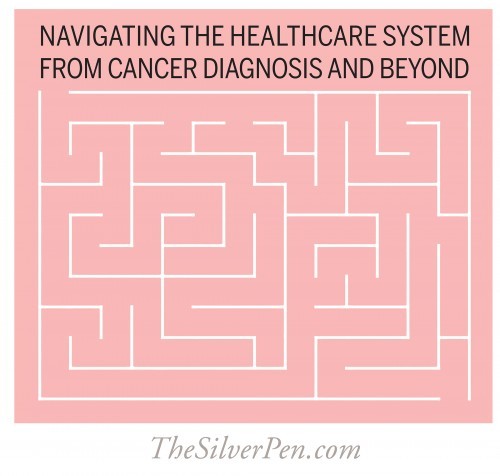Navigating the Healthcare System from Cancer Diagnosis and Beyond
Discovering that you have cancer is a life-rocking event. Understatement of the decade, I know. However, sometimes the obvious just must be stated. (Ha!)
Shortly after my diagnosis, I found myself feeling as if I were in a cobweb filled forest, with no idea which way to turn or where to go. The Silver Lining for me was that at the time of my diagnosis, I had been a clinician for over 15 years. So my compensatory mechanism was being my own nurse. In other words, I asked myself, “What would I say to a newly diagnosed patient?” or, more personally, “What would I say to a newly diagnosed friend?”
Here are 4 things that I would recommend (& that worked for me!):
- Ask your doctor or nurse for reliable resources to find information. Please don’t go on “Dr. Google“! As wonderful as Google is, when you’re scared and confused, as anyone newly diagnosed is, searching blindly can lead you down some scary and inaccurate paths.
- Having a spouse or friend accompany you to each and every appointment is a good idea. Two sets of ears are always better than one!
- Be direct in your meetings with your doctor(s) and make sure that he or she understands that you want accurate information to help you make the best decisions about your treatment.
- Organize the information that you gather in a clear, accessible way. A designated notebook or a file on the computer is a great first step.
- It is also important to build a network of support among friends and relatives. Identify a “go-to” person. This person may be a close friend or your spouse and should be someone you can call on day or night if you are overwhelmed or confused. Additionally, cancer support groups are helpful to many people. Making contact with others in a similar situation can be a source of comfort and information. Allow others to help you. It absolutely, positively takes a village to get through cancer!
Patients are Consumers. Become your own advocate. From the time of your diagnosis and throughout your treatment, you have options. It is your job to identify those options.
- Often it is helpful to call on patient navigators, health advocates, or medical consultants to be your partners in identifying the options and making decisions. These professionals know a great deal about options and can make sure that you get the answers you need. Ask your oncologist if your cancer center has these folks available.
- Additionally, the importance of creating your own personal health record cannot be emphasized enough. We cancer patients nearly always have multiple appointments and multiple doctors, and these can soon run together. I know mine did. Making sure to note exactly what happened at each appointment, the results of tests, and reactions to medications can be the best tool in managing your treatment. In fact, there is a bit of an art to putting together your personal medical record. I’ll do a post on it…
Know Your Insurance Policy. Familiarize yourself with your insurance policy.
- What is covered? What isn’t?
- Does your policy allow you to a second opinion?
- How much out-of-pocket expenses are involved?
- If you have insurance through your employment, make an appointment to see the liaison in human resources. This person should be able to answer most of your insurance-related questions.
Balance Routine with Flexibility. As much as possible, try to keep up your regular daily routine, but be flexible about modifying things as necessary. This is where the balance comes in. I found that I created a new routine, a new “normal” if you will. Having consistency and predictability helped me so very much because it allowed me to (even loosely) know what to expect. That said, your situation may change from throughout the process, sometimes from day to day. Another thing that I did was (and well, continue to do is!) work on prioritizing my life goals. What is important to you now? What isn’t? A cancer diagnosis is earth rocking. Life for me is now divided into before cancer and after cancer.
How about for you? I’d love to hear what worked for you!


